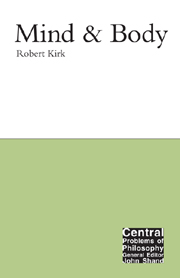6 - Functionalism
Summary
Philosophers working on the psycho-physical identity thesis around the middle of the last century were focusing chiefly on consciousness rather than intentionality. As far as beliefs, desires and other intentional states were concerned, they tended to think a behaviouristic account was possible. However, we have seen that merely asserting that conscious experiences are identical with brain processes is not enough. Even if the identities hold, what is it about brain processes that enables them to provide for conscious experience? Somehow it must be made intelligible that things like the activation of neurones should constitute sensations and experiences. When philosophers started looking for ways of dealing with this difficulty, some of their proposals turned out to apply not just to experiences but to the rest of mental life too. They were in fact varieties of functionalism. Although many philosophers favour this approach, it has its critics. John Searle has remarked, “If you are tempted to functionalism, I believe you do not need refutation, you need help” (1992: 9).
Leading up to functionalism
Consider this statement:
Different mental states tend to be caused by different sorts of external things, and in turn to cause different sorts of behaviour.
It is at least hard to dispute. It doesn't say that mental states are just behaviour, or even just behavioural dispositions. It says something that even Descartes would accept. Such reflections led to the idea that a mental state's causal relationships were characteristic of it: that each mental state was distinguished by its own unique pattern of causal links with sensory stimulation, with behavioural consequences, and with other mental states.
- Type
- Chapter
- Information
- Mind and Body , pp. 121 - 136Publisher: Acumen PublishingPrint publication year: 2003



